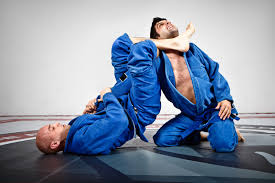7 Common Myths About Brazilian Jiu Jitsu

Continued Article
Watching Dern’s matches, it is clear that her father has played no small role in her development as a truly elite-level athlete. At seemingly every competition he is present in her corner, giving instructions from the sidelines, and celebrating every win. With two black belts for parents, a direct line to the first family of Jiu Jitsu, and having grown up in the top BJJ academy in the state, it is no wonder this environment would ultimately produce one of the most visible figures in the sport today.
But when asked if she has any insight into why Arizona in particular seems to produce so many world champions, both in grappling and MMA, she seems to echo the perspective of any teenager growing up in a Valley suburb. “Honestly, because I feel like we [laughs] don’t have that much to do, you know? I mean we can go hiking and stuff like that, we have Sedona — weekend stuff to do for people who like to hike — but it’s almost like it’s so hot that unless you want to go to the movies or to the mall it’s like ‘meh.’ For me, and my life, I’m just going to be training all the time.” By the time she had turned 19, she had been awarded her own black belt.
Similar to Olympic Judo, Dern’s landmark match with Garcia at this year’s Jiu Jitsu World Pros (see video from the match below) may be somewhat hard to follow for the uninitiated. Early in the round, Garcia is deducted a point for talking to the referee. From there, it was a matter of preventing Garcia from gaining a more dominant position — referred to as “passing the guard.” But rather than stalling and coasting to an easy win, Dern remains offensive throughout the duration of the match, attempting a leg lock at one point as well as near-constant attempts at a reversal or “sweep.”
As anyone who has taken a BJJ class can tell you, preventing a guard pass from a significantly larger opponent who is even vaguely familiar with the basic concepts of the sport is a difficult task in and of itself. But for Dern, a lifetime of competing at open weight had left her not only with the necessary experience, but also the mindset needed to beat Garcia. “A lot of people had said ‘she’s just too strong’ or ‘she’s just too big’ – what kind of point of view is that?,” Dern says of the match. “You have to think, or believe you can do it. If you don’t think that you can do it, then why are you fighting her? Why waste fighting in absolute [weight division]?”
Having faced Garcia several times in competition previously, Dern often describes the way she was able to develop a game plan that would guide her to victory as a feeling out process. But for her and her students, it is crucial to start and end with that most fundamental concept in BJJ – that with the proper technique, anyone can beat the larger opponent. “I think the biggest thing was for everyone else, just to see that it could be done independent of your size, and to give inspiration to other people. Obviously not fighting her, but just in their own divisions. I think it’s important for people to come back and believe in themselves.”
For Dern, it is also an idea that any woman wishing to train BJJ should become comfortable with early on. Like her parents and her environment, she identifies a willingness to spar with men as something which gave her a distinct advantage. “The most important thing is you can’t be nervous or get frustrated training with guys. I’ve gone my whole life training with guys. I just have girls class now and even then it’s not permanent, it’s still a work in progress,” she says. “I offer the women’s class just to compliment their Jiu Jitsu, because I think that we learn the most training with guys. We get pushed to our limits. We have to use more strength. Our defenses get good. We have to rely more on our flexibility. Obviously training with girls in some ways is more realistic, like a tournament. But I think training with both guys and girls is a great help.”
With a number of new high-profile events like the World Pros seemingly added every year, BJJ is undoubtedly growing as a sport, and Dern points to the large number of women brown belts who will soon swell the ranks of black belt competitors in the years to come. Perhaps among them we will see more figures like her, whose true mastery of the sport serve as an inspiration to others.
For Dern, it is a dynamic which perpetuates itself. “The more the girls stay with it, the more they’ll attract to come train and it will keep growing and growing and that’s what we need.”
Follow Jackalope Ranch on Facebook, Twitter, and Pinterest.





